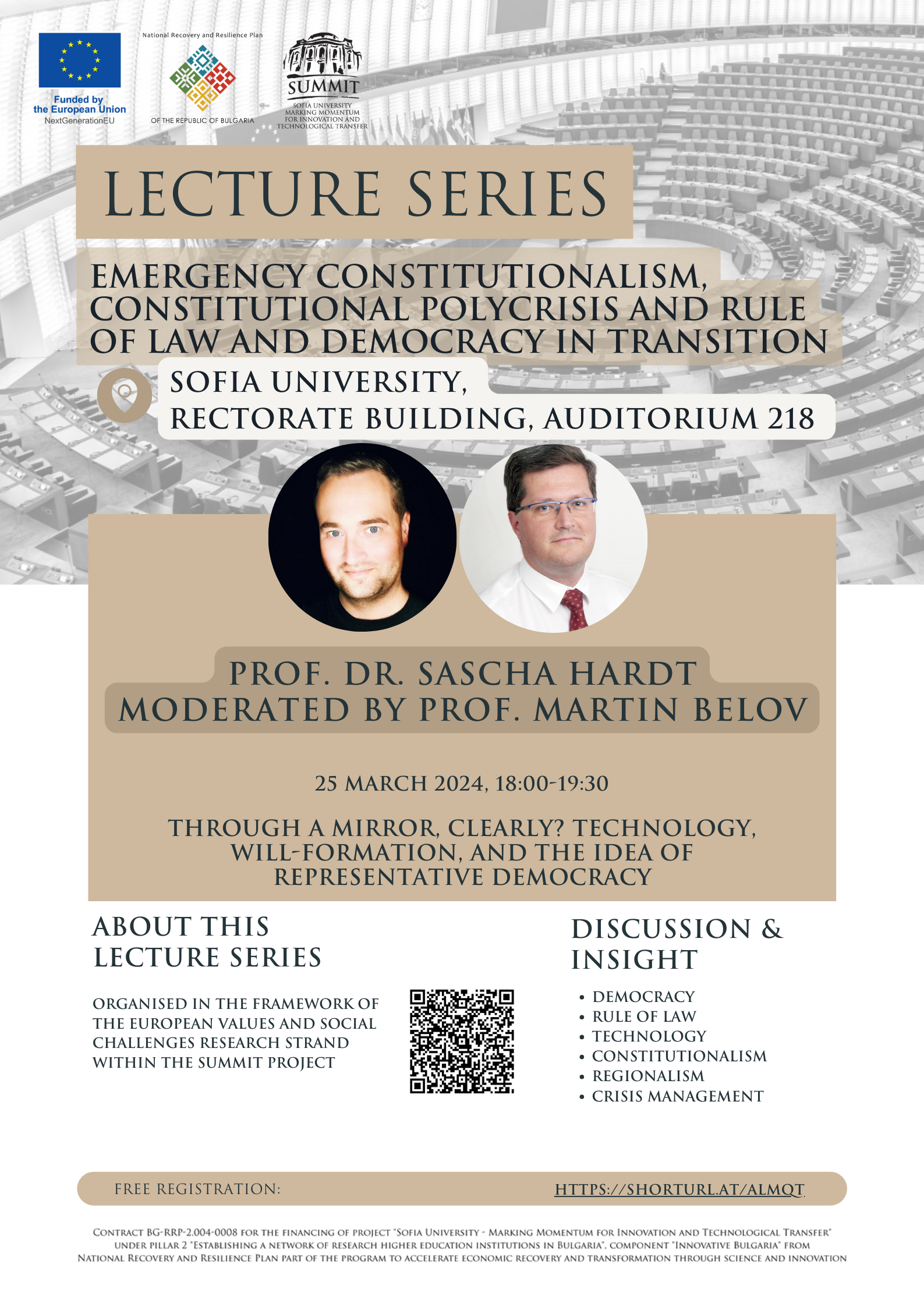Саша Хард от Университета в Маастрихт ще изнесе лекция на тема "Emergency Constitutionalism, Constitutional Polycrisis and Rule of Law and Democracy in Transition" (25.03.2024)
Please scroll down for the English version
Заповядайте на втората лекция от лекционната поредица "Emergency Constitutionalism, Constitutional Polycrisis and Rule of Law and Democracy in Transition". Лектор е д-р Саша Хард от Университета в Маастрихт, Нидерландия. Темата на лекцията е „Through a mirror, clearly? Technology, will-formation, and the idea of representative democracy”. Модератор на лекцията е проф. д-р Мартин Белов, организатор на лекционната поредица и заместник-декан на ЮФ на СУ "Св. Климент Охридски".
Лекцията ще се проведе на 25 март 2024 г. от 18 часа. Тя ще бъде на английски език. Лекцията ще се проведе на живо в 218 аудитория на Ректората на СУ „Св. Климент Охридски“ и онлайн през платформата Zoom. За участие моля последвайте този линк: https://us02web.zoom.us/j/89751856570

Лекционната поредица "Emergency Constitutionalism, Constitutional Polycrisis and Rule of Law and Democracy in Transition" си поставя за цел да изследва през критични и съвременни аналитични перспективи основните предизвикателства, които множеството кризи и режими на извънредно положение поставят пред правовата държава и демокрацията. Ще бъдат представени влиянията на дигиталната революция, конституционната поликриза и многостепенното управление върху ценностите, принципите и институциите на съвременните либерално-демократични конституционни системи. Лектори са изявени специалисти от водещи европейски университети. Лекционната поредица е организирана в рамките на изследователски проект „Европейски ценности и социални предизвикателства“, финансиран по проект SUMMIT.
"Emergency Constitutionalism, Constitutional Polycrisis and Rule of Law and Democracy in Transition" (Public Lecture, 25.03.2024)
https://us02web.zoom.us/j/89751856570
In representative democracy, elections (and sometime plebiscites and referenda) are imagined as the moments at which ‘the people speak’. According to the common narrative the public will manifests itself on election night. This public will, of course, is but a blend of individual political opinions, expressed in millions of voting decisions. Representative systems traditionally acknowledge this and try to legally protect public will formation by protecting the expression (freedom, equality, and secrecy of the vote) and formation of the individual political will (freedom of speech and assembly, freedom of the press). At the same time, it treats the public will as something abstract: except on election night, when individual decisions converge into a set of concrete numbers, it can be estimated – “through a mirror, darkly” – but not known.
Technology has disrupted this narrative. The people speak more frequently, more loudly, and much more directly than before the advent of social media. At the same time, individual political opinion as the kernel of the public will is no longer anonymous. It can be measured, tracked, and potentially changed at much smaller cost than ever before. These disruptions do not only change the way representative democracy works but call into question the idea of representation.
Sascha Hardt is assistant professor of comparative constitutional law at Maastricht University and fellow of the Montesquieu Institute. His research focuses on parliamentarianism, developments in (representative) democracy, as well as the status of members of parliament and other elected office holders. Next to his regular teaching activities at Maastricht University, he has taught at Lucerne University and served as adjunct professor at Airlangga University, Surabaya (Indonesia).

